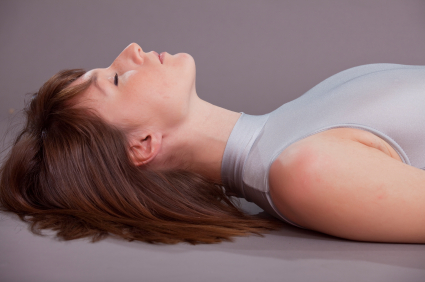I put a spell on you: hot flashes and hypnosis
I have written about the potential of hypnosis for ameliorating troublesome vasomotor symptoms previously, although earlier studies have focused on hot flashes in relation to breast cancer therapy. You can find those posts, and links to earlier reports, here.
Personally? I like hypnosis.
I was hypnotized several decades back by a source for another story that I was writing and recall how relaxing it felt. This particular clinician focused on teaching patients the art of self hypnosis for use in speeding recovery from surgery and the like. But I digress..
Hypnosis for menopausal symptoms? Why not?!
In a study that appears online in the Menopause journal, Dr. Gary Elkins from Baylor’s Mind-Body Medicine Research Laboratory explores the potential of clinical hypnosis — described as a “mind-body therapy to facilitate a hypnotic state, coolness and control of symptoms” — in a field where the effectiveness of alternative strategies continues to be challenged by mainstream medicine.
He write that while menopausal symptoms like hot flashes generally start to decline 5 to 7 years after menopause, they may persist in some women for up to a whopping 20 years!!!! Moreover, non-hormonal pharmacological options, e.g. antidepressants and anticonvulsants may seem promising but between side effects and the need to comply strictly to dosing regimens, they may not be a viable or reasonable option for many. Additionally, in the early studies conducted in breast cancer survivors, clinical hypnosis led to as much as a 69% reduction in hot flashes over the course of these trials,findings that are comparable if not better than those seen in women taking Effexor or Paxil.
This time, 187 women who reported having at least 50 hot flashes a week (or seven a day) participated in clinical hypnosis or a training called ‘structured attention control’ five times a week for three months. Women who were hypnotized were given specific suggestions for mental imagery for coolness, safe places and relaxation with the goals of reducing hot flashes and improving sleep. Each session lasted 45 minutes and were recorded, so that the women could practice self-hypnosis at home. In the structured attention session, also 45 minutes long, each woman and a clinician discussed symptoms, exchanged personal information, received guidance on how to avoid negative suggestions and were encouraged. While these sessions not recorded, the women brought home a CD that provided information about hot flashes and were required to listen to it daily.
The findings are pretty impressive. Elkin reports that over the first 6 weeks, women receiving hypnosis had a mean decrease in their hot flashes of almost 64% compared to only 9% in women who had structured attention training. These reductions continued towards the end of the study, leading to a 74% decline in hot flashes compared to the beginning of the study (during the same timeframe, women in the second group only experienced overall reductions of 17%). The severity of hot flashes also significantly declined over the course of the study by as much as 80% among hypnotized women (and only 15% among the structured attention group). What’s more, when hot flashes were actually monitored by a scientific instrument (rather than self-reports) findings were still impressive, with almost a 57% reduction in hot flashes in the hypnosis group and only a 10% reduction in the structured attention group. These women also reported better sleep quality and that their hot flashes interfered less in their daily activities than previously.
Research into pharmacological therapies and alternative therapies confirm that there is always a placebo effect at play. With regard to hot flashes in particular, this placebo effect is evidently substantial. And, with regards to mind-body therapies in particular, some women are negatively predisposed to achieving results, and either are not willing to make the commitment that is necessary for them to work. However, this is not much different than any regimen; if you are not committed to the process, you probably won’t see the best results.
Elkin writes that they still don’t know why hypnosis might work for hot flashes, although it might have something to do with improvements in heart rate and blood pressure (via a process known as ‘parasympathetic tone’). However, if it works, do we really need to know how?
Got severe hot flashes? You might want to delve into that spell before you try drug therapy. If anything, you’ll come out feeling a heck of a lot more relaxed!
Read More
Breathe in, Breathe out: Multitasking & Mindfulness Meditation
Got stress, a lack of focus, too much on your plate? Researchers from the University of Washington report that meditation, namely mindful meditation, can improve focus, benefit memory and reduce stress. What a concept, eh?
Mindfulness meditation is trained meditation. This particular study (reported in the May issue of Proceedings of Graphic Interface) used focused attention, which targets a person’s ability to voluntarily narrow or widen focus, place attention on the present moment, shift focus from one thing to another, and cultivate awareness of breathing and the body. While one group of workers participated in this type of activity, another were actively trained in progressive relaxation, whereby muscle groups are tensed and then relaxed, aided by mental imagery (e.g. “my arms are becoming heavy and warm) , an audio CD and weekly classes. Both of these groups then engaged in multitasking (e.g. scheduling a meeting, finding a conference room, writing an announcement, creating an agenda or eating and drinking). A third group waited 8 weeks, underwent multasking and then were trained in mindful meditation and retested.
The findings? People who were trained in and practiced mindfulness meditation reported lower stress levels during multitasking, were less negative and had less fatigue. Similarly, the group who received mindfulness training later in the study also reported reductions in their stress levels. What’s more, mindfulness meditation also appeared to improve focus (the participants shifted their attention less during a particular task) and memory.
The researchers attribute these benefits to the ability of mindfulness meditation training to help strengthen our ability to notice interruptions without necessarily stopping or diverting attention from the task at hand. Meditation has been associated with enhancing the ability to regular emotions; less stress translates into better recall. This particular domino effect is a win-win-win!
Obviously, more research is needed. But in the interim, it appears to mindfulness meditation may go well beyond hot flashes and attitude adjustments to multitasking, memory and stress reduction.
Om.
Read MoreGot Stress?
Did you know that April is Stress Awareness Month? All I can say is that maybe some of us need an entire year! That’s why I as devoting today to stress busting posts with tips aimed at ameliorating some of that stress out of your life, and in turn, ameliorating some of the more unpleasant parts of the transition. And while I can’t make any guarantees, I can confirm that learning to relax and let go can pave the way to wellbeing.
A few highlights from the Flashfree archives await!
From December, 2011: Mindfulness, meditation and stress. Learning to bring on the relaxation response can go a long way towards health and happiness.
From November, 2011: Yoga, insomnia and sleep quality. Don’t know about you but when I don’t sleep well, I react in ways that are not always beneficial. Apparently, yoga not only promotes better sleep patterns, but also, helps to boost stress resistance.
From March, 2011: Try a little mindfulness. It appears that by breaking down the components of one’s experience, you may be better equipped to handle a variety of situations. And although this particular information applies to hot flashes, the reality is that it is likely useful in all aspect of life.
From July, 2009: Why I bake. Sometimes simply incorporating pleasurable activities into our lives can help alleviate daily stressors. One of the web’s top social researchers says that baking is her path towards relaxation.
From September, 2009: The best medicine. Want to feel better? Laugh…to the point of tears.
From August, 2008: L’Chaim. Women gravitate towards ‘tending and befriending.’ No wonder; social support can go a long way towards alleviating stress.
What tricks of the relaxation trade work best for you? Care to share them?
Read MoreBringing back the woo-woo…or the ‘ain’t no woo woo.’ Mindfulness, meditation and stress
Are you familiar with the end of the year crunch? I’m in the midst of it and although life is scheduled to slow starting next week, I am finding that I am having difficulty keeping up. So, today, I’m bringing back the woo woo in hopes that it might influence my own inability to calm down the adrenals right now.
Apologies for being self-serving. To be truly honest, this is one of my favourite posts of this year so I’m bringing it back. One word at a time. Let’s start with the first:
Relaxation.
It’s so elusive for many of us. And yet, so important to our overall health and wellbeing. In fact, researchers are finally discovering how relaxation actually counters changes that occur in our bodies that result from exposure to constant stressors.
For decades, Dr. Herbert Benson, founder of the Mind-Body Institute in Cambridge, MA and an associate professor at Harvard University, has been writing about the relaxation response, a “mind-body intervention that elicits deep changes in the physical and emotional response to stress.” Strategies that elicit the relaxation response include meditation, yoga, tai chi, Qi gong, deep breathing, controlled muscle relaxation and guided imagery. And although many would like to point to the “woo woo” factor at-play, an evolving and wide body of published literature is indicative of how interested the medical community is in the mid-body connection and the positive changes that these practices promote, including a slowing or heart rate, a reduction in blood pressure, improvements in blood sugar and fats, and even boosts in our immune system. However, what has long eluded researchers is what actually happens in the body to achieve these improvements.
In a novel study published in 2008 in PLoS ONE, Dr. Benson and his colleagues looked closely at 19 volunteers who had practiced relaxation response strategies (e.g. meditation, yoga, repetitive prayers) for as long as 20 years and compared them to 20 novices, individuals with no relaxation practice experience. These novices were provided with training sessions for 8 weeks that included information about how to reduce daily stress and the relaxation response and a 20 minute, individually-guided session comprising diaphragmatic breathing, a body scan and meditation.For 8 weeks thereafter, the novices then used a 20-minute relaxation CD at home and were asked to review the informational brochures. Blood samples and analysis of gene expression between experienced and novel relaxation practices, and pre- and post-training were then compared.
Importantly, while the researchers observed distinct changes in the genes in experienced relaxation practitioners compared to novices, when the novices started to incorporate relaxation practice into their lives, they also started to express similar positive alterations in their genes. Moreover, these changes are directly related to how cells respond to stress and create free radicals and inflammation that can lead to long-term damage. Additionally, type of relaxation strategy that was practiced was of no important; by achieving a relaxation state, individuals could make positive changes in their cellular structures thought to promote health.
Both inner and outer psychological states and environmental factors play a role in how women experience peri and post-menopause, their self-esteem, attitudes and severity of symptoms. If a daily practice of some sort of relaxation strategy can actually alter genes in a way that improves health and well-being, why can’t that daily practice also improve the menopausal/midlife experience?
While I’ve long embraced the idea, I’ve never actually made a concerted effort to incorporate some sort of relaxation strategy into my daily activities. I’m going to change that. Ain’t no woo woo but a woot woot so far as I can tell.
Read MoreWednesday Bubble: Can yoga decrease insomnia, improve sleep quality?
I love that yoga practice continues to take center stage in Western medicine. Truly, this is mind boggling because rarely, if ever, has an alternative practice been given so much credence within the confines of a medical philosophy that allows little outside the box. However, just a few weeks ago, yoga made the headlines again with data showing that it might be useful for treating lower back pain than standard therapies.
In menopause, yoga practice has been explored for stress relief, to improve wellbeing and as a tonic for vasomotor symptoms. Notably, the latter are considered to be partially responsible for significant sleep issues that occur during and after menopause. Indeed, some data show that up to 81% to 83% of women may have sleep complaints and 52%, insomnia.
Yet, like many strategies, yoga is not a one size fits all practice and there are many branches and types, some being meditative and others breathing, and some more physical than others. These distinctions can make it difficult to standardize studies and apply their results. Still, I was thrilled to stumble across a study evaluating the effects of a specifics sequence of yoga on physical and mental health, and symptoms in menopausal women experiencing insomnia. Importantly, this study used a scientific, randomized controlled design to insure that test conditions were up to par with Western methodological standards.
Basically, researchers assigned 44 menopausal women diagnosed with insomnia to one of three group:
- a control group who ingested 500 mg calcium daily
- a passive stretching group, who participated in two, one hour passive stretching classes a week (including stretching of back, stomach, ankles, knee, thigh, elbow, shoulder, wrist and neck) or,
- a yoga group consisting of two, one hour sessions weekly. These yoga sessions were based on a sequence using stretching positions (asanas) with strong and fast breathing (bhastrika) followed by directed relaxation.
Women in these groups also took 500 m g calcium daily.
The study, which lasted for four months, showed that engaging in a particular sequence of yoga significantly reduced vasomotor symptoms and improved sleep/insomnia severity and mental health compared to passive stretching or simply taking calcium. Women who took the biweekly yoga classes also had higher quality of life scores and better resistance to stress. And while the passive stretching group certainly did not do as well, they did trend towards these benefits as well, especially with regards to the degree of reported stress in their lives.
The researchers believe that regular yoga practice, at least with these particular sequences, alters the nervous system and increases brain concentrations of a potent neurotransmitter – λ-aminobutyric acid – to help improve sleep patterns and reduce vasomotor symptoms. Likewise, stretching may lead to a state of calm that results in reduced metabolism, heart rate, blood pressure, breathing and muscle tension, all of which contribute to stress (or stress reduction).
Granted, this is a small study but it was rigorously designed and suggests that yoga may help sleep issues associated with aging and menopause. I, for one, want to run into a yoga studio. I don’t recall the last time my zzzz’s were not interrupted.
Read More










